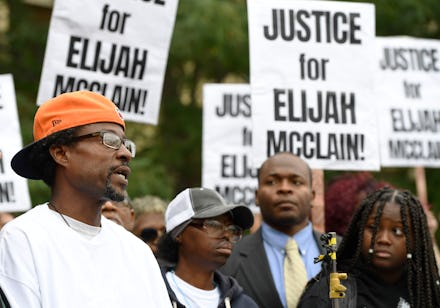Elijah McClain died after a police encounter a year ago. Why are we only hearing about it now?

As the national movement for Black lives enters its fourth week, the police killing of Elijah McClain is getting national attention almost a year after it occurred. On Aug. 24, 2019, police in Aurora, Colorado, stopped McClain, a Black 23-year-old, as he was walking home. The three arresting officers surrounded McClain, handcuffed him, and then used a carotid hold on the 23-year-old, which is a modified chokehold that is intended to render a person unconscious by cutting off blood flow rather than suffocate them by cutting off air flow. Then, after McClain was already unconscious, Aurora Fire Department officials arrived at the scene and injected him with ketamine to "calm" him.
The killing of McClain sounds like others that have drawn national attention in recent weeks. McClain, a self-proclaimed introvert and massage therapist who enjoyed playing violin, was walking home on the evening of Aug. 24 when police responded to calls of a person who looked "sketchy." At the time, McClain was wearing a runner's winter mask, which his family said was a way of keeping his neck and face warm, as he was anemic.
According to The Denver Post, officers approached McClain and touched him. "Stop tensing up, dude. Stop tensing up," an officer said to McClain, who responded by saying, "I am going home. ... Leave me alone. ... Let me go. I am an introvert. Please respect my boundaries that I am speaking."
Aurora police claim that a struggle ensued, in which McClain reached for an officer's gun. Officers said that they feared for their lives, and forced McClain to the ground, knocking their body cameras off their uniforms in the process. They used a carotid hold to subdue McClain. Audio from the killing depicts McClain saying, "Ouch, that really hurts. I’m so sorry. I don’t have a gun. I don’t do that stuff."
With his hands handcuffed behind his back, McClain vomited multiple times as a result of the pressue being applied to his head and neck. A police release of the arrest said only: "Officers arrived in the area and contacted a male still wearing a ski mask, later identified as Elijah McClain. The male began to resist the officer contact, a struggle then ensued, and he was taken into custody." There is no mention of McClain's cries for help or that the officers used a carotid hold — which can easily become a chokehold, given the only slight difference in arm placement — until McClain fell unconscious.
Fire department rescue personnel arrived at the scene, injecting an unconscious McClain with what they called a "therapeutic" dose of ketamine, and transferred him to an ambulance. He suffered a heart attack on the way to the hospital and, three days later, was pronounced brain dead and taken off life support.
Nearly a month after a Minneapolis police officer killed George Floyd and amid calls for justice in the police killings of Breonna Taylor, Tony McDade, David McAtee, Rayshard Brooks, and others, over 2 million people have signed a petition calling for justice for McClain. Since June 7, the district attorney who cleared the officers responsible for McClain's death of wrongdoing has received more than 10,000 emails and 1,000 voicemails pertaining to the case.
"The protests happening all over the country are an outpouring of rage and grief at the endless, relentless examples of unarmed Black people being brutalized and murdered at the hands of police," said Stephen Meswarb, the interim executive director at the American Civil Liberties Union of Colorado. "In August 2019, Elijah McClain, 23, died after a prolonged encounter with Aurora police officers. ... ACLU of Colorado is united in solidarity with protestors across the country demanding an end to violent, racist policing," Meswarb said.
Aurora Police Chief Nick Metz defended the officers' use of force, saying, "From the officers' perception, it went from an investigatory stop to a potential life-threatening incident." While Metz said that an officer's comments to McClain, in which the officer threatened to sic his dog on McClain, were "inappropriate and unprofessional," he stood by their work. "I think overall the officers did a good job trying to calm Elijah down," Metz said.
The district attorney, Dave Young, evaluated the case similarly, finding that the officers' activity fell in line with reasonable police response to what they believed was a situation that threatened their lives. Young reiterated recently that he does not plan to reopen the case.
A coroner's report at the time said that the cause of McClain's death was "undetermined," citing a potential mental health issue, or that vomiting while restrained by police could have restricted his breathing. But it's not uncommon for autopsy findings to be inconclusive. The first autopsy performed on Floyd's body found no evidence of a homicide, despite the fact that he fell unconscious after police officer Derek Chauvin knelt on his neck for nearly nine minutes. An independent coroner's findings contradicted the county's medical examination.
A year after McClain's death, none of the officers involved have been removed from duty. The McClain family is adamant that the police department's account of the killing is unjust. The family is demanding a criminal investigation into the three officers.